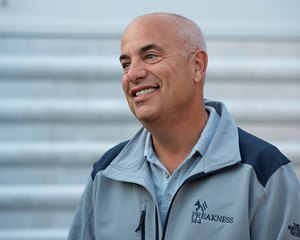Woodbine Panel Debates Claiming, Classification System


Speaking as part of a "Stronger Together" video conference panel organized by Woodbine Sept. 16, trainer Mark Casse backed a classification system in horse racing that could replace claiming races, a proposal opposed by trainer Kevin Attard.
A classification system was one of several topics discussed Wednesday during a nearly one-hour session with Jim Lawson, the CEO of Woodbine Entertainment, that also broached stewarding rules and wagering development. Lawson would also like to see Woodbine adopt an interference policy from Category 2 to Category 1, a move that could lead to fewer controversial demotions, and position itself to embrace sports betting and fixed-odds wagering on horse racing.
Though those topics generated discussion, the most spirited debate during the Wednesday panel concerned claiming races, likely due to Lawson and host Jason Portuondo being joined by Casse and Attard.
Casse, a Hall of Famer in both the United States and Canada, said he has been in discussions with The Jockey Club regarding possible changes to the claiming race system. He mentioned a proposal of horses running in classes, assigned to race at an alphabetical level, such as A, B, or C, based on qualifications and performance. Greyhound racing has long been conducted with a similar model.
To manage the absence of trade from removing claiming, he endorsed online sales as a means for the buying and selling of horses. He indicated some of his clients that focus on upper-level stakes horses could prove willing to cull their lesser stock through such sales.
He believes the current system of a mix of claiming races with allowances and stakes leaves too many horses without suitable racing options. Some owners don't wish to risk parting with their horses via claims.
"We have horses sitting in the barn that can't run. There is nowhere to run them—for months," He said. "That's not good for anybody. It's not good for Woodbine. It's not good for the owners. It's not good for the trainers. We have to change something because it's not working."
But claiming has worked spectacularly for Attard and some of his owners. He claimed Melmich for $20,000 in September 2014 for owners Stephen Chesney and Cory Hoffman, and the gelding became an eight-time stakes winner and millionaire in Canada. Another horse acquired via claim, Starship Jubilee, was plucked out of a $16,000 claiming race at Gulfstream Park in February 2017 by Attard's father, Tino. Under Kevin Attard's training, she became Canada's Horse of the Year in 2019 for Blue Heaven Farm.
She faces a trio of Casse runners, led by 2019 Preakness Stakes (G1) winner War of Will, in the Ricoh Woodbine Mile (G1T) Sept. 19.

"I've obviously made a good career out of claiming horses and done well doing it. So I am not a fan of the class races," Attard said.
He likes the immediate entry it allows owners into the sport as opposed to the wait from horses acquired as yearlings or unraced 2-year-olds.
"When a client approaches me, it is easier to sell them on possibly claiming a horse and maybe being back in the races in three weeks' time with an opportunity to get some return on your investment," he said. "Obviously, they have to understand they are animals. They're not machines. Sometimes the claims are going to be bad. They're not worth what you paid for them. It's like buying a used car. You go to the car dealership, you buy a used car—sometimes you're buying somebody else's problems. To me, horses are very similar in the sense. There is no warranty. There is no guarantee. You have to be prepared.
"If you go to a sale, you could spend $300,000, $400,000 on a horse—it doesn't mean it's worth that at the end of the day."
Attard believes individuals could try to take advantage of a classification system, leading to corruption by attempting to have their horses fall in certain classes.
"When you set a claiming price on them, to me there (are) no games played. You are running the horse at a value you think it's worth," he said.
However, Casse sees a fault in the claiming system, at least how some owners and trainers play it. He suggested some horses are patched up with the intention of trying to move along damaged goods.
"So many times in claiming races, they do things (with horses) just to get them to the races, so they get claimed. That's a big problem," he said.
Lawson acknowledged the trainers both raised valid points, though he said Casse is "singing from the same songsheet as me in terms of change in this industry is necessary."
"I like to think of Woodbine as an entity that is prepared to step out and do different things and try different things," he added. "We won't always get it right. But this industry in order to move forward and to be healthy—and I say healthy for generations, not just for six months, and for next year—we have to be looking at things we can do because we are standing still as an industry."
